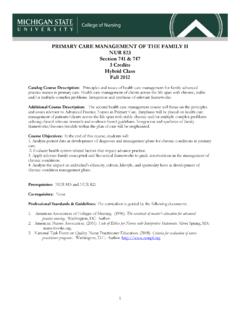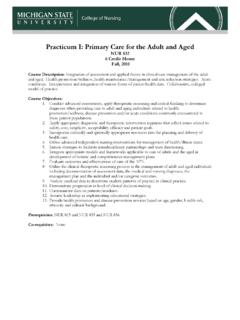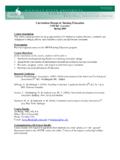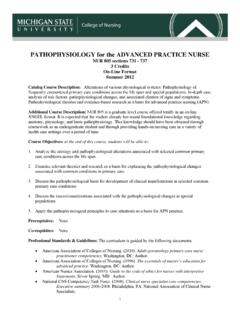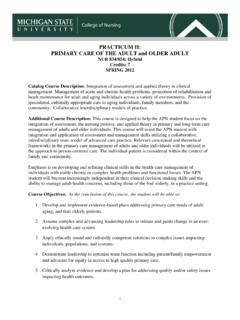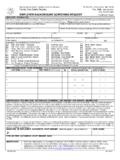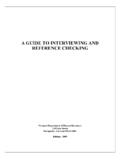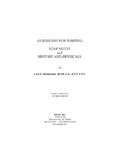Transcription of PHYSICAL ASSESSMENT FOR CLINICAL NURSE …
1 PHYSICAL ASSESSMENT FOR CLINICAL NURSE specialists NUR 860 Sections 732, 736 2 Credits Spring 2012 Catalog Course Description: Development of advanced health history and PHYSICAL ASSESSMENT skills for CLINICAL NURSE specialists . Course Description: PHYSICAL ASSESSMENT for the CLINICAL NURSE Specialist (CNS) is a course created and structured as an online theory based course to provide students the opportunity to extend and expand the depth of their PHYSICAL ASSESSMENT knowledge and skills. Within a holistic framework, students will learn how to systematically collect, analyze, synthesize and document their findings.
2 The context of human development through the lifecycle, therapeutic communication, health literacy and cultural values and beliefs are integral elements of the course content. Course Objectives: At the end of this course, students will: 1. Apply advanced therapeutic communication skills to data collection with varied populations 2. Utilize comprehensive health history and PHYSICAL ASSESSMENT skills for individuals across the lifespan. 3. Apply knowledge of cultural variations when collecting health ASSESSMENT data. 4. Synthesize subjective and objective health ASSESSMENT data into concise documentation. 5.
3 Apply selected ASSESSMENT skills to be utilized in a community-based CLINICAL experience. Prerequisites: NUR 805 Co-requisites: None Professional Standards & Guidelines: The curriculum is guided by the following documents: 1. American Association of Colleges of Nursing. (1996). The essentials of master s education for advanced practice. Washington, DC: Author. 2. American Association of Colleges of Nursing. (2011). The essentials of master s education in nursing. Washington, DC: Author. 3. American Nursing Association. (2001). The Guide to the code of ethics for nurses with interpretive statements.
4 Silver Spring, MA: 4. National Task Force on Quality NURSE Practitioner Education. (2008). Criteria for evaluation of NURSE practitioner programs. Washington, : Author. Faculty: Brigid Warren, MSN, RN, CS, Associate Professor Contact Information: 517-353-8686 E: mail: Office Hours: Arranged Note: Times can be arranged to accommodate student schedules. 1 2 Instruction: Required Texts: Ackley, B. J. & Ladwig, G. B. (2010). Nursing diagnosis handbook: An evidence-based guide to planning care (9th ed.). Mosby Elsevier: St. Louis, MO. American Psychological Association. (2010). Publication manual of the American Psychological Association (6th ed.)
5 Washington, : Author. Bickley, , (2008). Bates guide to PHYSICAL exam and history taking (10th ed.). Lippincott, Williams and Wilkins: Philadelphia, PA. Recommended Texts: Bickley, , (2008). Bates pocket guide to PHYSICAL exam and history taking (6th ed.). Lippincott, Williams and Wilkins: Philadelphia, PA. Smith, R. C. (2002). Patient-centered interviewing: An evidence-based method (2nd ed.). Lippincott, Williams and Wilkins: Philadelphia, PA. b. Required Resources, References, & Supplies: ANGEL Help Line (24 hrs, 7 days/week) (24 hrs, 7 days/week) (ANGEL Help link in upper right corner) Always check with the ANGEL Help Line first!
6 Additional materials will be available each week on the ANGEL site. Evaluation: Course Grading Scale: The course is graded as either Pass or No Grade. In order to Pass the course, the student must achieve a grade of 80% or higher on all assignments. Failure to meet 80% will constitute a failing grade and the student will not be allowed to continue on to the next CLINICAL practicum. The MSN student handbook discusses the procedures in the event of a failure of a course. % GRADE 94 100 93 87 86 80 (Minimum passing grade 79 75 74 70 69 65 64 60 Below 60 3 Teaching Method: On-line instruction utilizing reading and mixed media tools.)
7 Course format: The course framework is based on content specific units, each containing an outline, objectives, required reading and/or viewing, additional resources and assignments, postings or quizzes specific to the unit. history & PHYSICAL Exam ASSESSMENT : The student is responsible for identifying a mentor in a CLINICAL setting ( NURSE Practitioner required) to oversee and assess the student s performance in four specific areas: Pulmonary Cardiovascular Neurological Musculoskeletal Head-to-Toe the final piece to put it all together For each system, it is expected that you would perform the history and PHYSICAL exam on a friend, family member, patient, or willing subject pertinent for that system.
8 You will complete documentation for each system and submit your Word document into a drop box provided. A special emphasis is placed on the four areas specified. You will be provided feedback on all documentation. Your final Head-to-Toe history and PHYSICAL exam must be video taped (thumb drive or CD-Rom sent to the instructor) or use the option to come to campus and perform the Head-to-Toe exam with the instructor present. You would provide your own simulated patient if coming to campus. This assignment is Pass/Fail. To pass a score of 90% must be achieved (106/118 points). Class Attendance: As an online course, student attendance will be defined as frequent and active participation in course activities and assignments.
9 In the event of illness (individual or family) or other emergent issues, it is the responsibility of the student to contact the course faculty promptly. Communication with faculty: As a web-based course, a collaborative partnership between the faculty and online peers is expected. For questions regarding the course, please review the course syllabus prior to e-mailing. For questions regarding specific module content, post them in the discussion forum for the benefit of all the students. If you do not wish to be identified or for other personal questions or comments, please e-mail your questions to the course faculty.
10 Please note that every effort will be made to respond to e-mails and posts within 48 hours. It is not an expectation that faculty will respond to student questions or comments during weekends or holidays. Assignments and Grading: Assignments are due on the date indicated unless students receive approval for late submission by the course instructor. If students have been granted approval to revise and resubmit an assignment, 80 percent is the highest grade that can be received. If any documentation is not satisfactory, it will be returned to be resubmitted. Quizzes in ANGEL must be taken within the allotted time frame, and are only available once, unless a retake needs to be scheduled due to an emergency or technical challenge with ANGEL.

